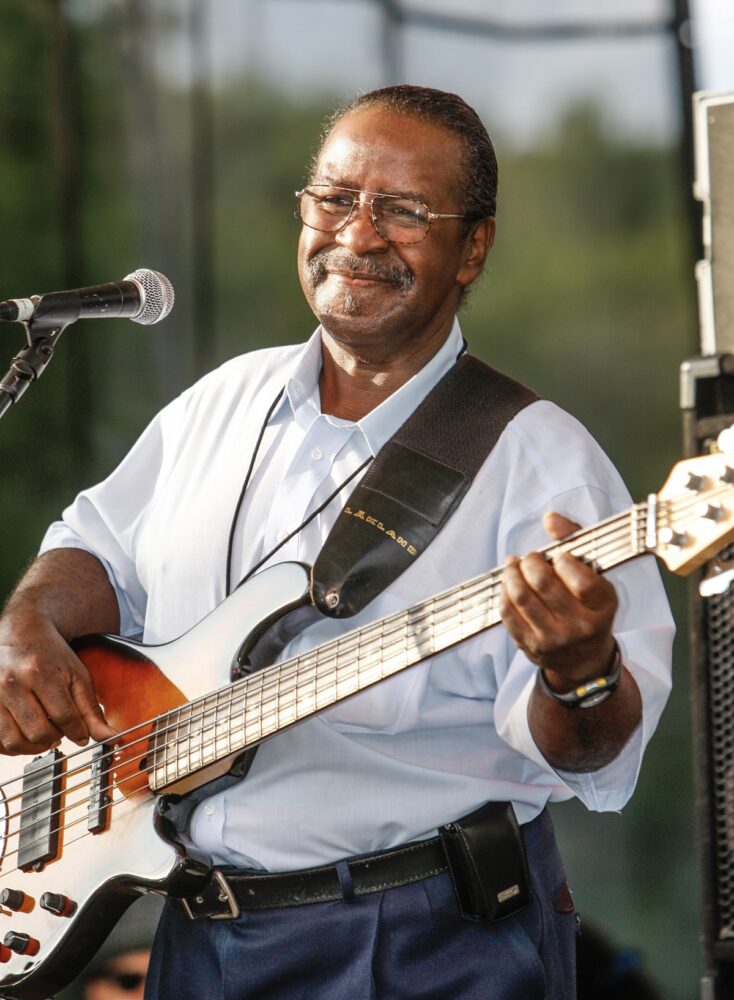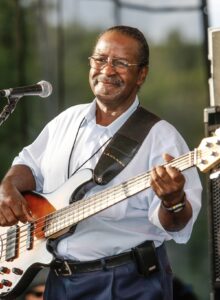Lee Allen Zeno Adds the Groove Glue
Diverse, inventive, rock-solid, and soulful
Published: August 31, 2023
Last Updated: November 30, 2023

Photo by Joseph A. Rosen
Zeno performs with Buckwheat Zydeco at the Pocono Blues Festival, July 9, 2009.
Born in Carencro in 1954, Zeno first felt music’s pull around age six. As he recounted to interviewer Jon Liebman for the website For Bass Players Only, “I would walk with my brother John to hear Lil’ Buck [Paul Senegal] and his band practice at a club I was way too young to get into. We’d stand outside and peek in the window and watch them . . . I liked the way Lil’ Buck’s guitar sounded. My cousin Harold Bruno played guitar, and he taught me . . . I started out playing with John and Harold in my cousin’s band, Clifton Zeno & the Hiphuggers. Our bass player didn’t show up for a gig one night, so Harold recruited me . . . and I never looked back!”
Zeno played with the Hiphuggers until age sixteen when he was approached by the bandleader with whom he would work for decades: Stanley Dural Jr., who performed under his childhood nickname of Buckwheat. Dural asked Zeno’s mother to let Lee Allen join his band, with the assurance that he’d get her son home at a decent hour on school nights.
Buckwheat and the Hitchhikers was a fifteen-piece band that performed cover versions of national R&B and soul hits by the likes of Earth, Wind & Fire and the Ohio Players. In choosing such mass-culture music, sung entirely in English, Dural reflected an assimilationist sensibility that then pervaded Louisiana’s French-speaking parishes. Since the early twentieth century, when speaking French was banned in Louisiana’s public schools, the state’s Cajuns and Creoles were pressured to downplay expressions of their indigenous ethos and linguistic roots, including music. As a young musician, Dural, who grew up in a French-speaking household, dismissed zydeco—as played on its signature instrument, the accordion—as dull music for old people. In Buckwheat and the Hitchhikers, Dural played a Hammond B-3 organ.
By the mid-1970s, however, a powerful cultural renaissance started sweeping southwest Louisiana. Self-respect, pride, and reverence for tradition replaced shame in ethnicity and pointless adherence to bland conformity. This fresh breeze encouraged people to resume speaking and singing in French. Cajun music and zydeco gained unprecedented broad new audiences and, during the ’80s, a global following. Reflecting this social shift, Dural set aside commercial cover songs in 1975 and went to work with the zydeco-accordion trailblazer Clifton Chenier. For the next five years, Dural toured far and wide with “the king of zydeco,” while Zeno worked locally around Lafayette, playing both R&B and zydeco, the latter with such accordionists as Fernest Arceneaux and Rockin’ Dopsie. When Dural left Chenier in 1978 to resume leading his own group, he and Zeno reunited. In a telling name change, Dural began billing himself as Buckwheat Zydeco and the Ils Sont Partis Band; “ils sont partis” means “they are gone” in French, but in Louisiana it’s also used as an exclamation that’s equivalent to “and they’re off!” which is shouted when horses leave the starting gate at racetracks.
In 1983 Buckwheat recorded for Black Top Records, a well-respected New Orleans–based company that mainly focused on rhythm & blues. Lee Allen Zeno’s playing so impressed Black Top’s co-owner and producer Hammond Scott that he hired Zeno as a session player for albums by notable artists such as the singer Solomon Burke and the guitar-vocal duo of Carol Fran and Clarence Hollimon, among many others. “Lee Allen was such a great resource for me on sessions,” Scott commented. “He had a wonderful sound, so deep, round, and full . . . he could play anything, he worked hard, he was so inventive, and he locked in that rock-solid bottom. All of my Black Top artists who recorded with Lee Allen loved him, and they loved his playing. He’s an absolute master and a joy to be around.”
“Lee is so versatile that every song took on just the right feel. And he’s the nicest guy.”
In 1984 Buckwheat Zydeco recorded for the Rounder label, and Zeno likewise impressed Scott Billington, who has since produced three Grammy-winning albums, among his other prolific work. Billington quickly added Zeno to his cadre of A-list session players. “Lee Allen’s talent as an arranger makes him a double asset on any recording session,” Billington explained. In 1992 Billington was producing Pictures and Paintings, an atypical jazz album by the singer and pianist Charlie Rich, who was best known for the ’70s country hit “Behind Closed Doors” and the ’60s R&B classic “Mohair Sam.” “There was one song,” Billington recalled, “where we struggled with the bass line. We tried a number of approaches. I was almost ready to drop the song . . . but the record company really believed in it. Lee Allen listened a few times and then played a part that made it come alive. It was like he added the groove glue, for one of the most amazing transformations of a song that I had ever heard.”
Billington also hired Zeno to play on Sing It!, the 1998 collaborative album by vocalists Irma Thomas and Tracy Nelson and vocalist-pianist Marcia Ball. Ball, a native of Vinton, Louisiana, observed that “Lee is so versatile that every song took on just the right feel. And he’s the nicest guy. When I went to record my most recent album, Shine Bright, there was no doubt that I’d hire my favorite bass player.”
The Cajun folklorist and linguist Barry Ancelet found Zeno to be a quick study at “jumping time” on old-school material with irregular song structure. Some musicians who are used to standardized consistency have great difficulty making this quirky, unpredictable adjustment. “I saw how versatile Lee Allen was while working on the album Travailler, C’est Trop Dur: The Lyrical Legacy of Caesar Vincent, which is based on field recordings of Vincent from the ’50s. We needed a bass line for a song with crooked, uneven verses and several shifts in rhythm. Lee Allen said ‘crooked timing is no problem’ and nailed it on the second take.” Such keen intuitive spontaneity underscores Zeno’s firm belief that, despite advanced audio technology, “computerization is losing the human feel. It doesn’t have the electricity that live musicians do—you can never capture that with computers.”
In 1987, thanks to his new manager and producer, Ted Fox, Stanley Dural signed with a major label, Island Records. Buckwheat Zydeco’s debut album on Island, On A Night Like This, significantly—one could say stratospherically—elevated Dural’s career. In 1988 Eric Clapton hired Buckwheat Zydeco as the opening act on a tour of North America, followed by twelve nights at London’s Royal Albert Hall. From then on Zeno found himself rubbing shoulders with celebrities such as Clapton, James Brown, Bob Dylan, and Ringo Starr, who recognized Zeno’s great talent and treated him like a respected peer. “All those guys were really nice and down to earth and friendly,” Zeno recalled, “like you been knowing them for years. That does a lot for your morale as a musician.”
Zeno stayed with Buckwheat Zydeco until Dural’s passing in 2016. At this writing Zeno continues to work with a wide variety of musicians but restricts his travel to the short-run radius of New Orleans and Houston. “I can’t sit and ride in a van for sixteen hours like I used to,” he noted. Zeno also directs the R&B ensemble known as the Ragin’ & Blues Band for the traditional music program in the School of Music and Performing Arts at the University of Louisiana at Lafayette. “I’ve been doing that for about four years,” he said, “and I enjoy seeing the kids light up when they figure out how to play something that I’ve shown them.”
Recent years have been challenging for Zeno, between major health issues and significant storm damage to his house. The Lafayette-based organization Love of People is helping Zeno and other local musicians pay their medical bills, while the band Alligator Blue has set up the GoFundMe page “Giving Back to Lee Allen Zeno” to assist in fixing his home. Amidst these trying circumstances, Zeno, a devout Catholic, finds great comfort in his faith. “You can’t beat prayer,” Zeno stated with conviction, “no matter what denomination you’re in. Prayer keeps me straight. Like my mom always said, ‘If you can go play music, then you can go to church, too.’ It’s just that simple.”
Ben Sandmel is a New Orleans–based writer, folklorist, and producer. The former drummer for the Grammy-nominated Cajun/country band The Hackberry Ramblers, Sandmel is also the author of Ernie K-Doe: The R&B Emperor of New Orleans. In May 2018 the LEH honored Sandmel with an award for his Lifetime Contributions to the Humanities. In August 2021 Sandmel graduated from Tulane University with an MA in musicology.
